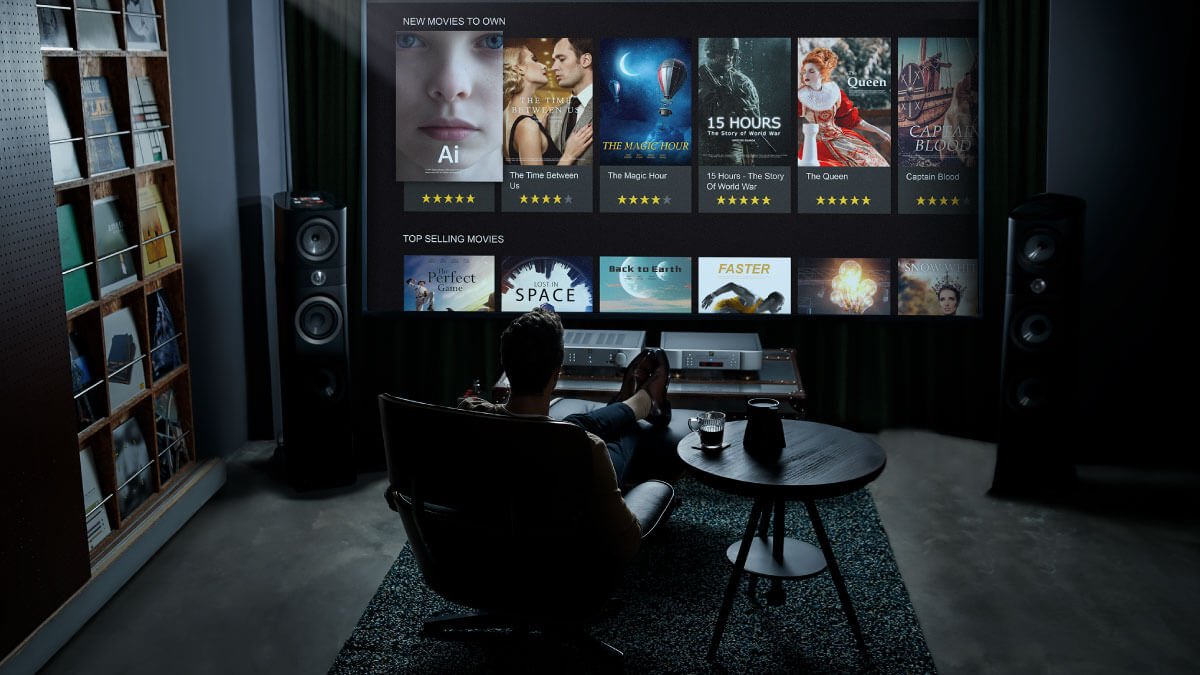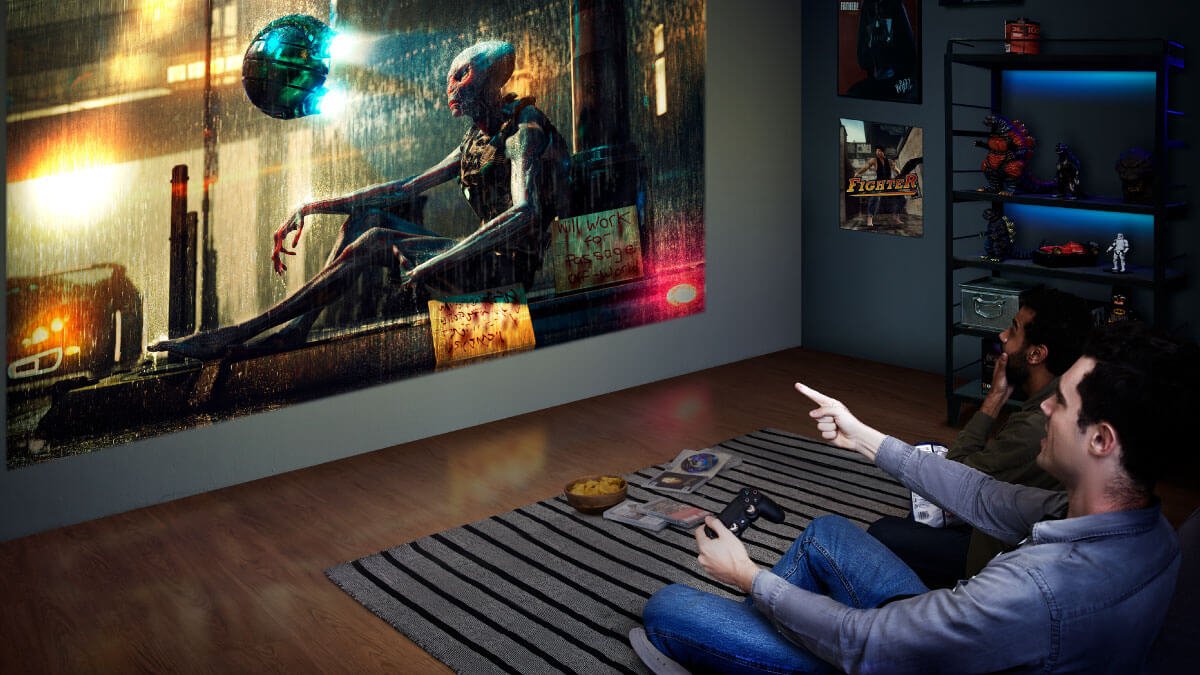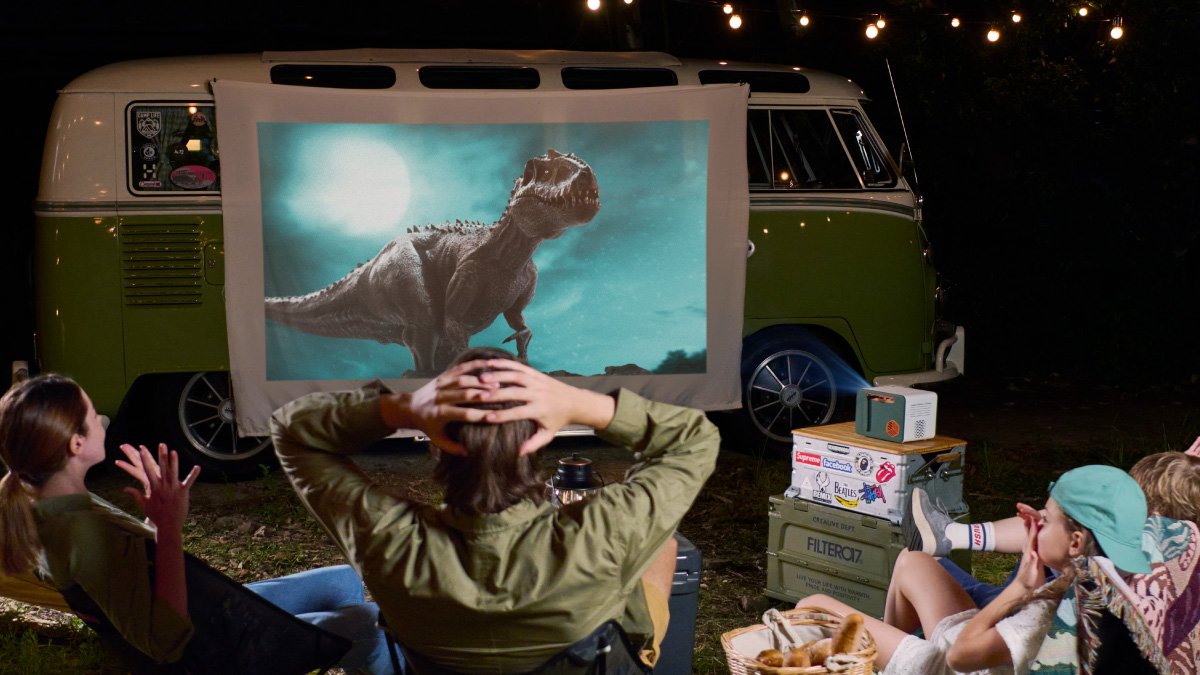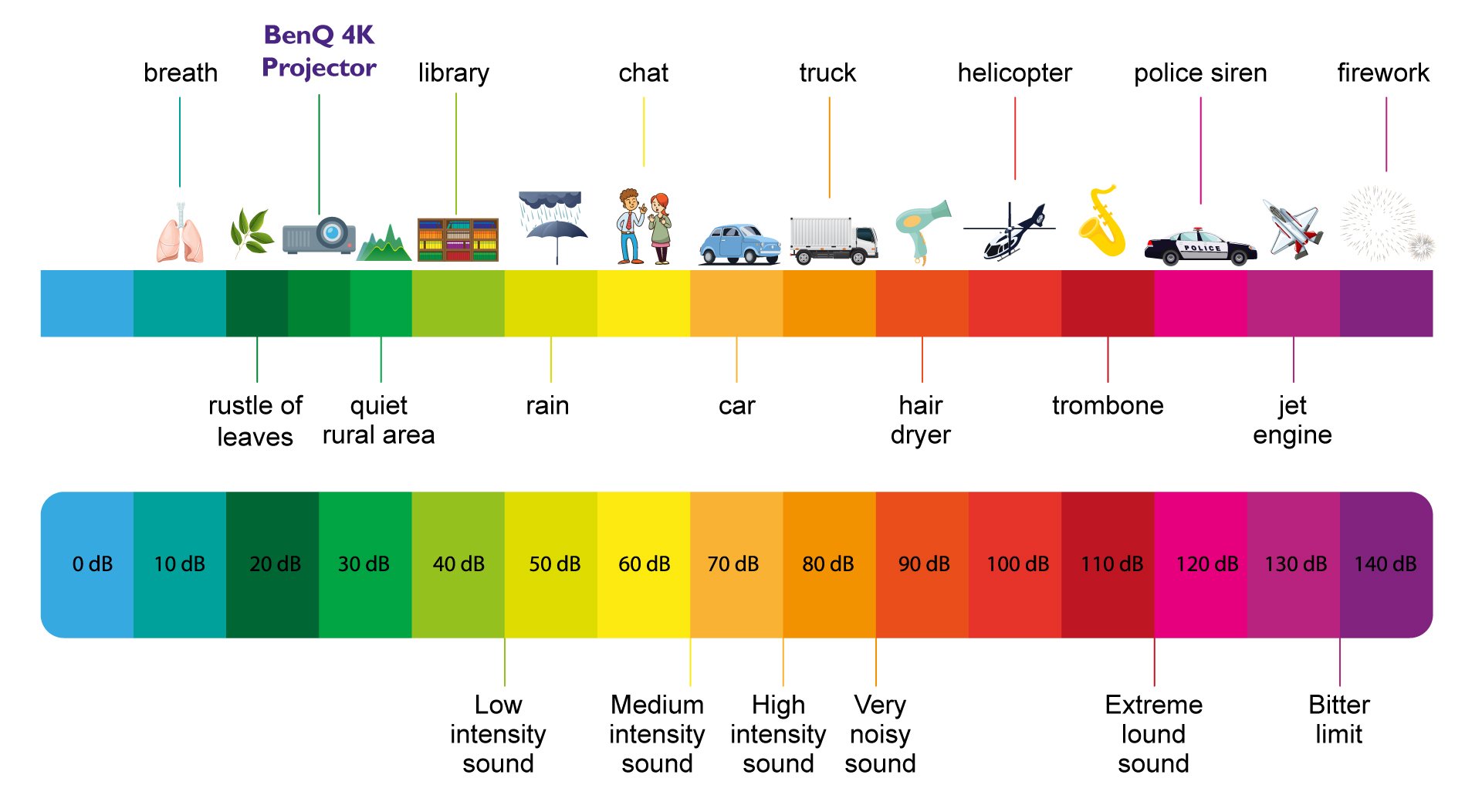
Thinking of upgrading to a projector? Maybe you’d like to have a bigger screen experience to enjoy the movie night with your family or support your favorite sport team with friends. For any reason, choosing the right projector will elevate your end goal, to have better enjoyment.
While there are numerous projectors out there on the market, how can we decide on the best one that suits our needs? Here are some considerations to choose the perfect one.
If you are building your house now while considering having a dedicated home-theater room and already have the specific model in mind, you can build a room that caters to the specification of your desired model.

No need to worry if you are not, below are some questions that you can answer:
ⓐ How big is your room?
The dimensions of your room will determine the size of the projection linked to the throw distance and desired placement. It is common to have at least 100-inch projection size for a home theater. This is interpreted as throw ration in a projector. The relationship between projection distance and screen size is defined as Throw Ratio = Throw Distance / Image Width
You can easily check the information on the product as “screen size at xx distance”. For example, “100 inch at 2.5-3 meters” like BenQ W4100i with 1.3x digital zoom. Another way to check based on the room dimension is to utilize BenQ AR Projector planner app for iPhone or iPad or using our easy-to-use BenQ projector calculator.
Utilizing these tools can help you measure the optimal projection size and placement for BenQ projectors. Using a shorter throw projection will give you a big advantage. Even in smaller room, you still can large 100 inch projection easily with BenQ TK705STi. Get your 100 inch only from 1.8 meter.
ⓑ How big is your screen size goal?
It is common to have at least 100-inch of projection when installing a projector in your home. However, latest projectors can easily project up to 200 inch, like BenQ W5850.
Your screen-size goal will be closely related to your room size and the placement of the projector. There are three types of the projector on the market: Throw distances for a 100-inch (diagonal) screen in meters.
Below is the throw and placement basics
| Projector Type | Average Throw Ratio | Approximate Throw Distance |
Projector Type Ultra-Short Throw (UST) | Average Throw Ratio 0.23:1 to 0.4:1 | Approximate Throw Distance 0.5 to 0.9 meters |
Projector Type Short Throw | Average Throw Ratio 0.4:1 to 1.0:1 | Approximate Throw Distance 0.9 to 2.2 meters |
Projector Type Standard/Long Throw | Average Throw Ratio > 1.0:1, often 1.2:1 to 1.5:1 | Approximate Throw Distance 2.5 to 3.5 meters and up |
For example, if your desired projection size is 100 inch, you can choose projector with standard throw and place is around 2.5-3.5 meters from the screen if the room allows.
The lighting ambience will affect the quality of the projection if you are using wrong products. Will you place the product in a dark room? Will you place it in the living room with more light? Or for outdoor backyard? Where you plan to place your projector closely related to the brightness needed from it to show the best projection.
Projector brightness is noted in ANSI lumens, ignore any other types of lumens in the market as sometimes it tends to mislead users. For a small gathering in indoor or small rooms, a projector with 500-1000 lumens will deliver an enjoyable viewing experience.
In a dedicated home theater with dark room, projector with 2,000 ANSI lumens or above will give you a great details, especially if paired with accurate color technology. A projector with similar brightness like BenQ GP520 and TK705STi still reliable to be placed in rooms with some ambient light, like in the living room.

The image quality provided by on-the-market projectors are the results of projection resolution. From FHD (1280x1080 pixels) to 4K resolution (3840x2160 pixels), this will affect the details of the images resulted from frames. If you’re into a home theater systems, 4K projectors will be the perfect as cinemas are using 4K projectors as well. However, we need to be aware of the true 4K resolution and enhanced 4K resolution.
While the two are both playing 4K contents, enhanced 4K mostly shows 2K resolution but fired twice to seemingly shows 8.3 million pixels, while in reality it only shoots 4.1 million pixels. True 4K is 8.3 megapixels and is considered as showing true 4K resolution by using a DLP 4K UHD chipset with advanced image processing, ensuring incredibly fast pixel switching speed. This delivers a 3840 x 2160 resolution with 8.3 million distinct pixels for each frame, four times higher than full HD 1080p. With more pixels delivered, you won’t miss any details.

As home entertainment evolves, so does the technology around it. We used to have lamp-based projectors in the market, which have already been left behind, especially with EU ban in 2026. Nowadays, most of the projectors in the market utilize LED or laser-based light to elevate your enjoyment need for streaming or gaming.
The future of projectors are LED and laser due to reasons below:
Feature |
LED | Laser Phosphor | RGB Laser | Lamp |
Feature Instant On/Off | LED Yes | Laser Phosphor Yes | RGB Laser Yes | Lamp Requires warm-up |
Feature Light Source Life | LED 6–10x longer | Laser Phosphor 6–10x longer | RGB Laser 6–10x longer | Lamp Standard lifespan 2,000 – 4,000 hours |
Feature Color Coverage | LED Very Good | Laser Phosphor Very Good | RGB Laser Excellent | Lamp Good |
Feature Mercury Content | LED Mercury-Free | Laser Phosphor Mercury-Free | RGB Laser Mercury-Free | Lamp Contains Mercury |
Feature Speckle Issues | LED None | Laser Phosphor None | RGB Laser Visible | Lamp None |
Feature Light Source Cost | LED Moderate | Laser Phosphor Moderate | RGB Laser High | Lamp Low |
Feature Power Consumption | LED Moderate | Laser Phosphor Low | RGB Laser Lowest | Lamp High |
Feature Maintenance Cost | LED Low | Laser Phosphor Low | RGB Laser Low | Lamp High |
A projector’s performance is not solely determined by its light source but also relies on a combination of optical systems, electronic controls, image processing, and color correction technologies. These components work together to produce the final visual output. Worry not, all of BenQ projectors are already using LED, 4LED or laser lamp source, which is mercury free, for healthier and longer enjoyment.
If you are planning to purchase a projector, you also need to check what kind of activity you will use it for the most. Is it for a movie night with your family? Is it a game night with friends? Or a backyard escapes with kids? For whatever reason it is, there are some features on the projectors that can help to increase your usage enjoyment. Focus on your intended use rather than a single specification.

What matters most
Clear All
{{displaySortType}}

{{item.displaySortType}}
{{item.productWordingData.productWordingTitle}}
{{item.productWordingData.productWordingTitle}}
{{item.productWordingData.productWordingTitle}}
{{spec}}
{{item.price}}
{{item.price}}
{{item.promotePrice}}
Save {{item.savePrice}}
Pre-order Now Pre-order will be available starting {{item.localReleaseDate}}
Pre-order Now Pre-order will be available starting {{item.localReleaseDate}}
Pre-order Now Pre-order will be available starting {{item.localReleaseDate}}
{{item.created}}
{{item.img}}
{{item.link}}
{{item.gamodelid}}
{{item.skucode}}
{{item.stock}}
{{item.price}}
{{item.category}}
{{title}}
We will notify you when we have more.
We will send you an email once the product become available.Your email will not be shared with anyone else.
Sorry, our store is currently down for maintenance.We should be back shortly. Thank you for your patience!
The requested qty is not available
The requested qty exceeds the maximum qty allowed in shopping cart
Product that you are trying to add is not available.

What matters most
Motion clarity metrics: GtG (gray-to-gray) & MPRT determine ghosting/motion blur. DLP projectors use micromirrors (not LCD overdrive), helping avoid artifacts.
Refresh rate: Projectors can reach up to 1080p 240 Hz on current models for ultra-smooth gameplay; on the other hand,many TVs top out at 60–120 Hz.
Input lag: Low-lag modes emphasize real-time control; the article frames lag as a core pillar alongside refresh/MPRT.
Clear All
{{displaySortType}}

{{item.displaySortType}}
{{item.productWordingData.productWordingTitle}}
{{item.productWordingData.productWordingTitle}}
{{item.productWordingData.productWordingTitle}}
{{spec}}
{{item.price}}
{{item.price}}
{{item.promotePrice}}
Save {{item.savePrice}}
Pre-order Now Pre-order will be available starting {{item.localReleaseDate}}
Pre-order Now Pre-order will be available starting {{item.localReleaseDate}}
Pre-order Now Pre-order will be available starting {{item.localReleaseDate}}
{{item.created}}
{{item.img}}
{{item.link}}
{{item.gamodelid}}
{{item.skucode}}
{{item.stock}}
{{item.price}}
{{item.category}}
{{title}}
We will notify you when we have more.
We will send you an email once the product become available.Your email will not be shared with anyone else.
Sorry, our store is currently down for maintenance.We should be back shortly. Thank you for your patience!
The requested qty is not available
The requested qty exceeds the maximum qty allowed in shopping cart
Product that you are trying to add is not available.

What matters most
Ambient light rules everything: Shading/time of day can matter as much as raw lumens. Set your projector near trees or a canopy. Avoid projecting between 11 a.m. to 2 p.m. choose late afternoon, however nighttime will yield best results
Brightness guidance:
▪ Shaded/dusk small gatherings: about 500–1,000 lumens can look good.
▪ Brighter/partially shaded early evening: ≥2,000 lumens recommended.
Portability: Batteries and compact designs simplify outdoor movie nights. You will have freedom without the need to be constantly connected to a power socket. Like BenQ GV50
Screen choice: A quality screen helps overcome ambient light (explicitly noted as a big factor). BenQ
Quick spec targets
Prioritize looking for projector with lumens (≥2,000 if not fully shaded), portable form factor/battery if you move around, sturdy outdoor setup and a decent screen
Clear All
{{displaySortType}}

{{item.displaySortType}}
{{item.productWordingData.productWordingTitle}}
{{item.productWordingData.productWordingTitle}}
{{item.productWordingData.productWordingTitle}}
{{spec}}
{{item.price}}
{{item.price}}
{{item.promotePrice}}
Save {{item.savePrice}}
Pre-order Now Pre-order will be available starting {{item.localReleaseDate}}
Pre-order Now Pre-order will be available starting {{item.localReleaseDate}}
Pre-order Now Pre-order will be available starting {{item.localReleaseDate}}
{{item.created}}
{{item.img}}
{{item.link}}
{{item.gamodelid}}
{{item.skucode}}
{{item.stock}}
{{item.price}}
{{item.category}}
{{title}}
We will notify you when we have more.
We will send you an email once the product become available.Your email will not be shared with anyone else.
Sorry, our store is currently down for maintenance.We should be back shortly. Thank you for your patience!
The requested qty is not available
The requested qty exceeds the maximum qty allowed in shopping cart
Product that you are trying to add is not available.
More and more modern devices are relied on the universal connection of USB-C. Eventhough USB-C may looks the same, however there are different version such as USB 3.1, USB 3.2, and the latest, USB 4. USB-C can handle all your needs from data transferring, power delivery, and transmitting audio and video through DisplayPort, or even better, do it all at once.

Clear All
{{displaySortType}}

{{item.displaySortType}}
{{item.productWordingData.productWordingTitle}}
{{item.productWordingData.productWordingTitle}}
{{item.productWordingData.productWordingTitle}}
{{spec}}
{{item.price}}
{{item.price}}
{{item.promotePrice}}
Save {{item.savePrice}}
Pre-order Now Pre-order will be available starting {{item.localReleaseDate}}
Pre-order Now Pre-order will be available starting {{item.localReleaseDate}}
Pre-order Now Pre-order will be available starting {{item.localReleaseDate}}
{{item.created}}
{{item.img}}
{{item.link}}
{{item.gamodelid}}
{{item.skucode}}
{{item.stock}}
{{item.price}}
{{item.category}}
{{title}}
We will notify you when we have more.
We will send you an email once the product become available.Your email will not be shared with anyone else.
Sorry, our store is currently down for maintenance.We should be back shortly. Thank you for your patience!
The requested qty is not available
The requested qty exceeds the maximum qty allowed in shopping cart
Product that you are trying to add is not available.
BenQ projectors use an advanced DLP architecture engineered for exceptionally low noise. We select components that minimize air turbulence and avoid high-pitched motor whine, and employ smart cooling that dynamically adjusts fan speed based on internal thermal monitoring.
For an even quieter experience, Eco Mode further lowers noise by reducing fan speed—maintaining HDR playback at a slightly reduced brightness. Recent 4K models like the GP520 run as quietly as 24–26 dBA, the W2720i at 26–28 dBA, and higher-end units such as the W5850 operate within 27–30 dBA.

Congratulations on choosing your projector! After investing in your desired projector, the next questions is how you can elevate the experience with the right screen? While a decent flat white is also an option for the first-timer, however to let the projector showing the best color and getting more immersive, get a dedicated screen is also considered a worthy investment. Follow these steps to choose the right screen for you:
① Screen types (pick by space & install)
a. Fixed frame: flattest surface; easy install; choose ALR fabric in bright rooms. Best for dedicated theaters.
b. Retractable: pull-down (manual), motorized non-tensioned (convenient but can curl), motorized tab-tensioned (stays flat; pricier; needs power).
c. Portable: floor rising and foldable/tripod for move-around setups or rentals.
② Size & seating distance (comfort first)
a. Go as big as your wall/viewing distance allows; bigger needs farther seating.
b. Rules of thumb: movies ≈ diagonal × 1.3; everyday TV ≈ diagonal × 1.8 (aligns with SMPTE ~30° / THX ~40° guidance).
c. Check throw distance with BenQ’s Projection Distance Calculator or BenQ AR App.
③ Screen material (match room light & audio plan)
a. Color: white is the default for home use.
b. Gain: “no/low-gain” keeps uniform brightness and wide viewing angles; high gain risks hot-spots, areas on the screen that appear overly bright or unnatural.
c. Acoustic (AT) weaves: place speakers behind the screen; best in darker rooms due to lower reflectivity.
d. Bottom line: Choose based on space, lighting, install complexity, budget, and match to your projector’s throw, brightness, aspect ratio, and resolution for the best overall experience.